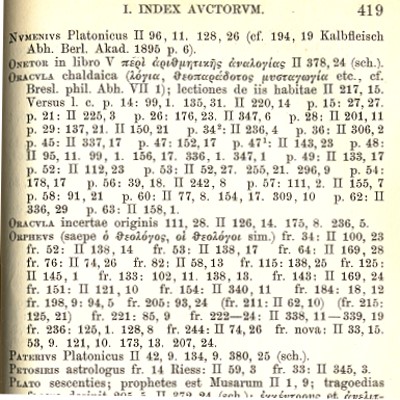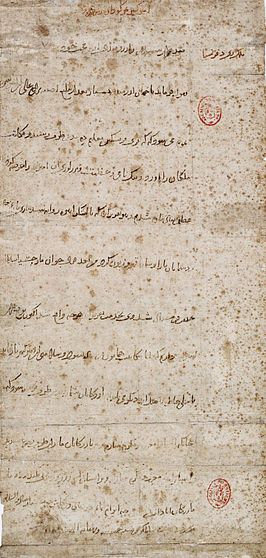MikeH
Kwaw wrote
Note 281 (I assume that's what you meant) cites Hankins p. 522, which we've already seen. In addition, it cites an Oration of 1429. Strausberg says:
My attempt at a translation:
Huck wrote
Strausberg also refers to Zoroaster in the sentence before. But it has as its source, as indicated in footnote 277, the same page in Hankins that I have already posted and that we have discussed. If there is something new, please tell me what it is.
I do not understand at all how you come to the conclusion that
Kwaw wrote
Thank you for putting the references to Ideas in bold. I sometimes miss things. If I have missed something else, let me know. I now have checked out from the library Tarrant's 2007 translation of Proclus's Timaeus Commentary, which has lots of notes.. I also got the In Platonis Rem. Publc. Comment. ed. Kroll, both volumes (vol. 1, at least, is on-line). There is a nice index in the back of vol. 2, with numerous entries for Chaldean Oracles. There is also an entry for "Zoroaster astrologus." If I find anything of interest either way, I will post it.
The following might be of interest, p.138 and notes re:Filelfo, Zoroaster, Pletho etc.,
I am in the midst of transcribing it and google translating it but have to go out now - but hopefully Huck may better relate what it says (and save me the trouble of making a probably erroneous translation) ?
esp. note 181 re; January 1429?
http://books.google.com.tr/books?id=gBzyaezyN60C&pg=PA138#v=onepage&q&f=false
Note 281 (I assume that's what you meant) cites Hankins p. 522, which we've already seen. In addition, it cites an Oration of 1429. Strausberg says:
In einer Oratio aus dem Jahre 1429 (!), in der Zoroaster bereits als Fürst der Mager bei den Persen erwähnt wird, legt sich Filelfo noch nicht auf eine Reihenfolge fest,..
My attempt at a translation:
This only says that in 1429 Filelfo considered Zoroaster part of the Magi in Persia. It does not even make him part of the sequence of philosophers/theologians that ends in Plato; in fact Strassburg explicitly denies that he said such a thing then.In an Oration from the year 1429 (!), in which Zoroaster is already mentioned as a prince of the Persian Magi, Filelfo does not commit himself yet to a sequence...
Huck wrote
Footnote 279 is in support of a particular sentence footnoted in the text, which is just about Zoroaster living 5000 years before the Trojan War, as stated by Plutarch and repeated by Plutarch and Filelfo. As far as I can tell, it says nothing about Filelfo talking about Zoroaster's writings or even about the Oracles, much less that Zoroaster wrote about the Ideas. If it does, please translate the German for me. It only shows that Filelfo in 1429 had by then read either Plutarch Isis and Osiris, or Plethon, or both.Stausberg notes, that Filelfo wrote already in 1429 about Zoroaster ("Oratio de laudibus historiae, poeticae, philosophiae" noted as "Una prolusione inedita di Francesco Filelfo" - Strausberg, footnote 279, p. 137/138; Stausberg refers to "Gualdo Rosa").
Strausberg also refers to Zoroaster in the sentence before. But it has as its source, as indicated in footnote 277, the same page in Hankins that I have already posted and that we have discussed. If there is something new, please tell me what it is.
I do not understand at all how you come to the conclusion that
Perhaps there is something I am missing. If so, quote it. To be sure, Zoroaster might have been talked about in Greece (as opposed to Italy) as the author of the Oracles, thanks to Plethon's writings (which were likely pre-1427) or others.' But we don't from these sources have any reason for thinking so.I think, we have to assume that Zoroaster had been already in the general scholar talking, when Filelfo had been in Greece.
Kwaw wrote
We have no reason yet for thinking that Filelfo thought before 1427, or even 1430, that Zoroaster wrote the Chaldean Oracles. The name "Chaldean" means "Babylonian"; hence even if they were considered Zoroastrian--which is possible--they would have been considered products of the Zoroastrians in Babylon, not of Zoroaster himself, who lived in Persia, maybe thousands of years before the Babylonian ones who taught Orpheus and Pythagoras. Hence the name "Chaldean." It is true that Filelfo might then have thought Zoroaster to have been the author, but if so there is no indication yet; and if he had, the likeliest source would have been Plethon.While there is no mention of Zoroaster in my quotes directly, there are quotes from the the Chaldean Oracles - which I suspect even in the early 15th century to a man like Filelfo who had spent several years studying Greek and collecting Greek texts in Constantinople is as equivalent to "Zoroaster says" as it was in the second half of the 15th century in the latin west.
Thank you for putting the references to Ideas in bold. I sometimes miss things. If I have missed something else, let me know. I now have checked out from the library Tarrant's 2007 translation of Proclus's Timaeus Commentary, which has lots of notes.. I also got the In Platonis Rem. Publc. Comment. ed. Kroll, both volumes (vol. 1, at least, is on-line). There is a nice index in the back of vol. 2, with numerous entries for Chaldean Oracles. There is also an entry for "Zoroaster astrologus." If I find anything of interest either way, I will post it.



